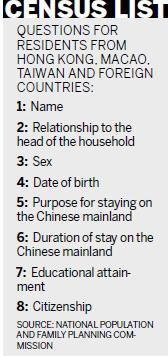Census privacy guaranteed for foreigners
The Chinese government has pledged to protect the privacy of people from Hong Kong, Macao, Taiwan and foreigners living and working on the mainland during the country's sixth national census.
The latest census, starting Nov 1, will for the first time include foreigners and non-mainland residents who are living on the mainland.
"Income and religion will not be included in the questionnaire," Zhang Weimin, deputy chief of the National Bureau of Statistics, told reporters Tuesday in Beijing.
"All census enumerators will take an oath of confidentiality, and any information provided in the questionnaire cannot be used as evidence in administrative actions against the interviewees," he said.
The questionnaire for non-mainland residents is much shorter than for mainland residents - there are only eight questions, including "purpose for staying on the Chinese mainland" and "educational attainment".
 |
"An increasing number of foreigners are participating in China's economic life and share local public services, so the census needs their information for appropriate policy making," Zhang said.
A national census counting foreigners and non-mainland residents living and working in the country is an "internationally accepted practice," he said.
The United Nations also suggests countries consider international migration in their censuses, he said.
More than 400,000 foreigners have residence permits in China, official figures showed.
Around 6.5 million census takers will be recruited for the sixth national census, most of whom will be local residents, or staff from neighborhood or village committees.
Each enumerator will work 40 to 60 days and is responsible for collecting data from 250 to 300 people, said Feng Nailin, head of the National Bureau of Statistics' population and employment statistics department.
China carries out a national census every 10 years, and the previous five censuses only covered people with the nationality of, and living in, the People's Republic of China.
The census in 2000 showed the world's most populous country had 1.29 billion people.
According to the National Population and Family Planning Commission, the population on the mainland is expected to reach 1.39 billion by the end of 2015. As many as 700 million people will be living in urban areas, exceeding the country's rural population for the first time.
The number of people aged 60 or over is expected to increase by 8 million annually to 200 million by the end of 2015.
 0
0 






